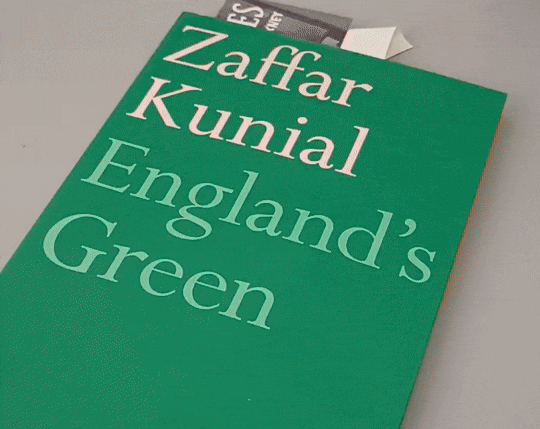Words are weird.
Little symbols and sounds that can send images and ideas into someone else’s brain?! That’s wild. But, because of their ubiquity, we often take them for granted. As a language, English requires a collection like England’s Green by Zaffar Kunial to show the language for what it is: beautifully peculiar.
First and foremost, Zaffar Kunial is a master of sound. This is self-evident in the opening poem, ‘Foxglove Country’. He twists syllables to constantly excavate links and meanings between words; throughout the collection, Kunial demonstrates that sound itself is a constituent building block of meaning and, therefore, of feeling. It’s so different to other things that I’ve read: the deconstruction of words into their constituent parts taps into some urge behind our motivation to convey meaning in the first place, a hidden language behind language itself.
As well as, or perhaps because of, this fluency with sound, Kunial strikes me as a particularly well-read writer. In a book titled England’s Green, one might expect the poet’s allusions to Macbeth, ‘The Charge of the Light Brigade’, Thomas Hardy, and the Brontës. But there’s also something strange at work. As Kunial says during an interview for his T. S. Eliot-Prize-nominated collection,
‘The England in the title may be [...] a real place, but it’s also a kind of England of the mind, really. [...] I don’t want England to be, like, an exclusionary thing. [...] I don’t see there being a contradiction between something being very old and kind of inclusive.’
For this reason, there is something Classical about Kunial’s work whilst still being fundamentally groundbreaking in its approach. I feel that this is because the voice of the poems really appreciates and respects language, and the potential for it, and not in some jingoistic English-supremacist way, either. The spaces that the poems form as a result of the careful moulding and considered production of sounds has an air of reverence about it. Plath once said that English writers write ‘Poetry with a capital “P”’, meaning that, with the weight of literary history behind them, they’re often too frightened to use the language in new or unconventional ways. In Kunial’s case, it’s quite the opposite; knowing where the words come from gives you more room to move forward.

As you may guess, flora makes up a lot of the collection’s key imagery. My favourite piece in the collection is ‘Foregrounds’, where the voice of the poem uses a bonsai as a key image to describe relationships to their male forefathers. The poem is split into regular 10-line stanzas, spilling awkwardly between a couple, almost like a bonsai that’s been artificially truncated. It contains such stunning descriptions of the bonsai as ‘A trunk of wounded rings, collecting inches / from each owner’s time’ and ‘Its four-hundred-year-old sigh’. But a bonsai isn’t quintessentially English, is it? The reveal is overleaf: the next pages are full of Haikus, and gorgeous ones at that:
Clouded Yellow – blur in the laburnum – old dim light I remember.
There’s also the titular image in ‘The Hedge’: a traditional measure of estate gardens, land ownership, boundaries, and mazes. But it’s transformed into Britain’s ‘green envelope’, ‘Thorned blank verse’ or ‘A bewitched curtain’. The ability to resignify something so ubiquitous as hedges — or, indeed, so mundane as the language that we use each day at the shops, in the office or on Instagram posts — into something far more mysterious and open-ended is a powerful poetic feat. Kunial shows us that poetry can defamiliarise something we know, or think we know, and reveal the underlying truths behind it.
There’s something I like to say in relevant job interviews (or general conversation about literature and language): the writers and readers of the world share a secret, and know that words are magic. With the correct combination of words in the right order, you can make anyone in the world laugh, cry or rethink their life. Hence the power of “magic words” in fairy stories, I suppose. With his collection of phonemes, plosives, tagmemes, fricatives, and glottal stops, Zaffar Kunial shows us the magic within words themselves. After reading England’s Green, we’re all better off having a peek behind the curtain.
All love,
Baz 🧡💙
P.S. If you’re going to read one poem by this author, please let it be ‘G’.






